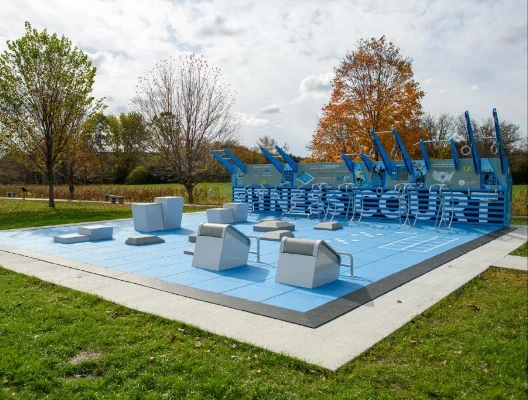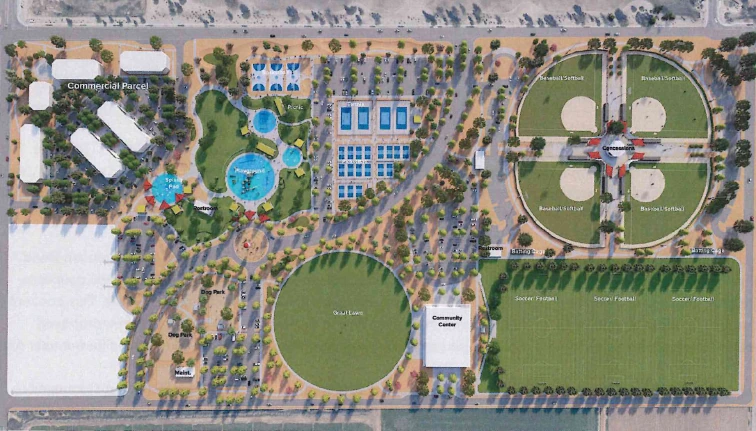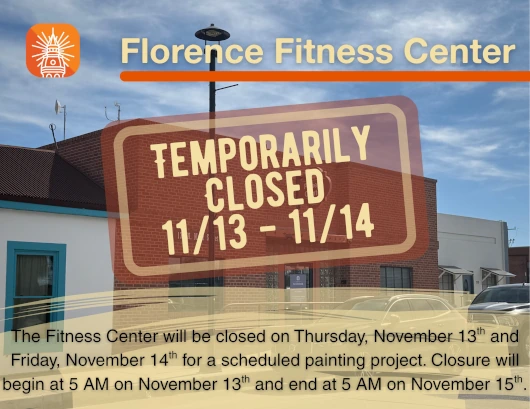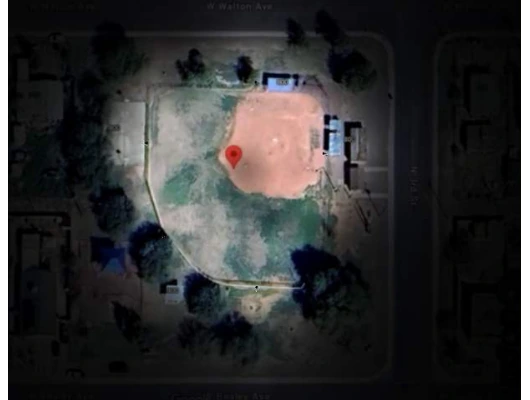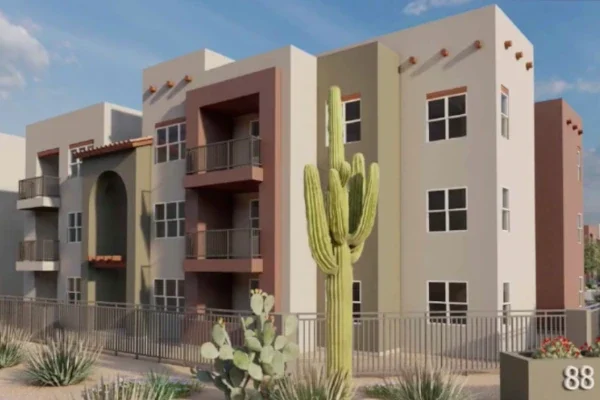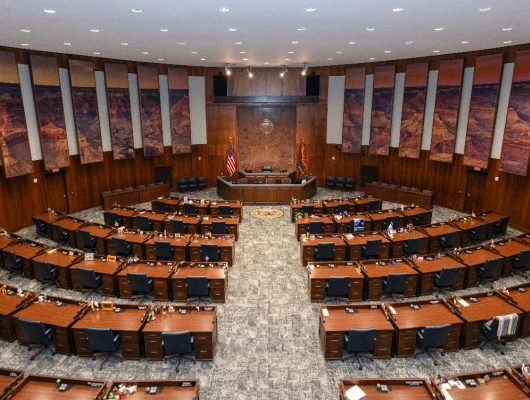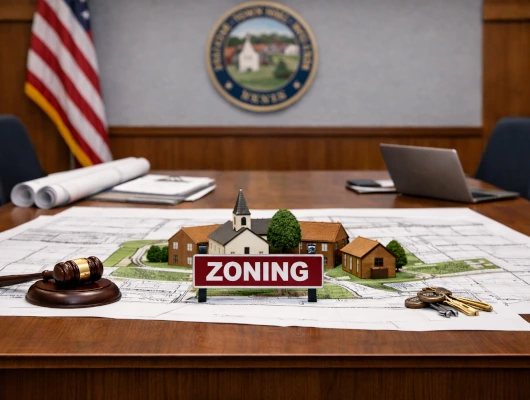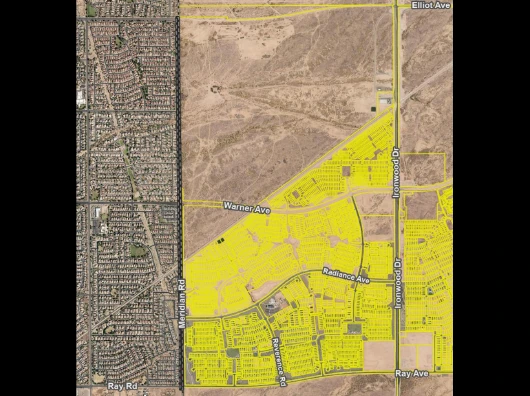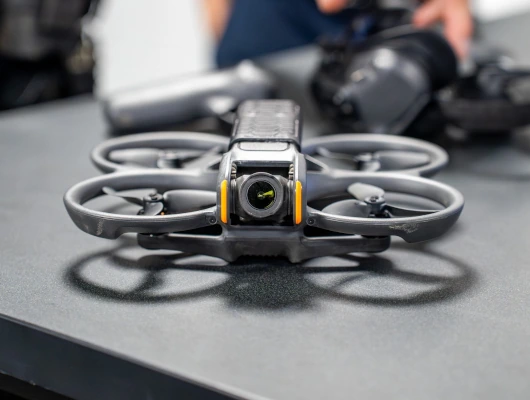The Coolidge City Council moved forward with the Regional Park Project at their October 27, 2025 meeting, approving nearly $2 million in earthwork for the park at the southeast corner of Coolidge Avenue and Skousen Road. The Council tabled a decision on an outdoor fitness court until additional cost details can be gathered
Regional Park Earthwork Contract Approved
The Council approved an agreement with Ellison-Mills Construction to perform earthwork needed for Phase One of the Coolidge Regional Park project. The 66-acre park site, which excludes an existing archery range and a commercial parcel, will be developed in phases. Phase One encompasses just under 10 acres but includes the most amenities, while later phases will add sports fields, an amphitheater, and additional facilities.
The $1,998,810.53 contract will be funded through impact fees. Impact fees are one-time charges paid by developers to fund infrastructure improvements needed to accommodate new growth. Staff estimates the earthwork phase will take one to one and a half months to complete.
Phase One Amenities and Funding Structure
Phase One of the Regional Park will eventually include amenities such as a dog park, playground, sport courts, picnic areas, and walking trails. According to the 2023 Coolidge Regional Park Master Plan, the sport courts will include four tennis courts, 17 pickleball courts, and three basketball courts. The city has already secured grant funding for the dog park, which will feature three separate fenced areas: one for large dogs, one for small dogs, and a third for rotation during maintenance periods.
LaPaglia explained that the city is working on a grant application for a walking trail that will extend throughout the entire 66-acre property. The city is also preparing to apply for a $1.5 million grant through State Parks, which is federally funded, though that process is currently on hold. Future phases outlined in the master plan include three soccer fields with lights, four softball fields with lights, a community center, and a maintenance building. Phase One development is being funded through a combination of impact fees and grants. The earthwork contract is funded by impact fees, while the dog park has been secured through grant funding.
LaPaglia emphasized the importance of utilizing impact fees in a timely manner, noting that if the funds are not spent within required timeframes, the city must return them to developers. The earthwork represents a necessary first step that must be completed before any amenities can be installed.
Impact Fees Support Park Development
City Manager Gilbert Lopez explained that impact fee revenue continues to flow from active construction permits throughout Coolidge. Current residential development includes Century Completes building behind Safeway, D.R. Horton continuing work in Heartland Three, and Cross Creek still constructing homes.
Councilmember Tom Bagnall noted that the city’s current impact fee balance stands at $2.062 million. Lopez explained that the earthwork contract will be paid in phases rather than all at once, allowing impact fees to continue accumulating as the project progresses.
“We’re pretty active on permits right now. We’re doing really well,” Lopez said, adding that larger projects like Selma Solar will also contribute impact fees. The city recently released approximately 15 additional permits after working with Arizona Water Company to secure water meter releases.
Park Staffing Requirements Discussed
Councilmember Bagnall raised concerns about the city’s capacity to maintain the new park with current staffing levels. LaPaglia acknowledged that adding the Regional Park would significantly increase the workload for parks staff.
Currently, city parks staff maintains approximately 100 acres of park space. The 66-acre Regional Park would roughly double that responsibility. LaPaglia told the Council that once Phase One is completed, the city would need to add two full-time staff members whose sole job would be maintaining the Regional Park.
“We cannot start putting stuff in and then maintain the staffing levels we have currently. We would have to add to that,” LaPaglia said, noting that all city departments can fall behind when understaffed.
Council Explores Bond Financing and Economic Strategy
Bagnall proposed organizing a study session with City Council, staff, and the Parks and Recreation Board to explore financing options for accelerating park development. One option discussed was floating a municipal bond to fund construction.
The councilmember noted that Coolidge successfully issued a 20-year bond for the swimming pool that is on track to be paid off in approximately half that time. While a park bond would be larger, Bagnall suggested that declining interest rates could make the timing favorable for such financing.
LaPaglia responded positively to the idea, noting the swimming pool bond’s success and expressing openness to exploring similar options for the Regional Park.
Bagnall also highlighted the economic benefits of developing the park, noting that increased traffic and activity would enhance the value of the adjacent 5.8-acre commercial parcel the city plans to sell. “If we get that property up and we get the utilities out there and everything, and we start having more traffic coming in and out there with the activities, that commercial corner’s gonna be worth a lot more money because there’s gonna be a lot more traffic out there,” he said.
The mayor mentioned that the city is in discussions with companies about contributing to park development, potentially through naming opportunities for ramadas, playgrounds, or other features.
Fitness Court Decision Tabled for Further Study
The Council voted to table a decision on purchasing an outdoor fitness court from the National Fitness Campaign after concerns emerged about going into debt for equipment that would not be ready for installation for several months.
The city received a $50,000 discount from the National Fitness Campaign toward the purchase of one fitness court for the Regional Park. The city would need to provide $131,640 in matching funds for the equipment, plus an estimated $40,000 for a concrete pad and $34,500 for installation.
However, LaPaglia informed the Council that the city did not receive a separate grant it had applied for to cover the city’s match. With the earthwork contract approved, purchasing the fitness court would create a $68,000 shortfall in impact fees that would need to be reimbursed as additional fees are collected.
Bagnall expressed support for the fitness court amenity but raised concerns about the timing. “I think it would probably be nice to have it but it’s an unknown on when we’re gonna have the impact fees,” he said.
The Council tabled the item to allow staff time to gather comprehensive cost estimates, including shade canopy expenses, and to determine how long the $50,000 discount offer remains valid. Staff will schedule a study session for December to review all project details with complete cost projections.
Mayor Emphasizes Need for Amenities
Mayor Jon Thomson framed the Regional Park investment in the context of Coolidge’s competitive position among nearby communities.
“We do have the lowest pressing median price of any of the cities and towns that surround us in housing and we don’t have the near the amenities that a lot of them have. And we need to pick up our game in that,” Thomson said.
The mayor expressed confidence that the city would find funding solutions without jeopardizing fiscal stability, noting that park development would not happen overnight and the city has historically managed to work through budget challenges conservatively.
Thomson also noted that a large apartment complex is planned for the area immediately south of the park site, adding to the need for recreational amenities. The park will also serve the Heartland and Heartland Two neighborhoods located across Coolidge Avenue from the site.
Project Timeline and Next Steps
Following the approval of the earthwork contract, Ellison-Mills Construction will begin site preparation following the contract approval. The earthwork phase is estimated to take one to one and a half months to complete.
The city is also making progress on water infrastructure. Staff confirmed that Arizona Department of Environmental Quality has approved all payments for electrical lines needed to connect a well that will provide non-domestic water for irrigation. Installation of those lines is expected to take two to three weeks once scheduled.
LaPaglia raised the need for pedestrian safety improvements, advocating for crosswalks connecting the neighborhoods across Coolidge Avenue to the park. “Kids aren’t gonna walk to the corner across the street, and there’s four lanes of traffic with people traveling sometimes at high speed,” he said, noting this would add to project costs but is important for safety. The mayor indicated there may be more than one such crosswalk needed.
Once the earthwork is finished, the city will proceed with installation of funded amenities, beginning with the dog park. The fitness court decision will be revisited at a December study session, where Council members will review complete cost projections including shade structure estimates.
The Regional Park represents a significant investment in recreational infrastructure for Coolidge, with city leaders viewing enhanced amenities as essential to making the community more competitive with surrounding municipalities.
